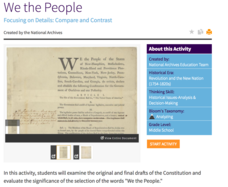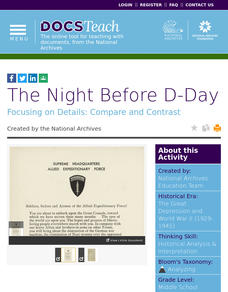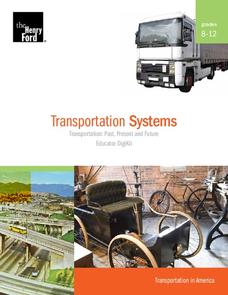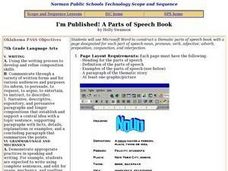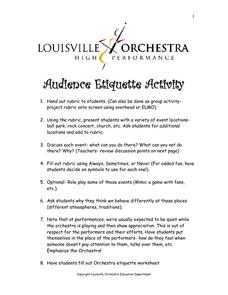Curated OER
Public Policy Changes Using Technology
Students discuss the problem of wrestling on the playground that has resulted in injuries to classmates. They research the problem using print and Internet resources. They listen to a presentation by the high school wrestling coach. They...
Center for History Education
To What Extent Were Women's Contributions to World War II Industries Valued?
Women rose to the challenge when the nation's war effort called them—but were sent home when the GIs came back from World War II. Young historians consider whether the United States valued women's contributions during the war using a...
Library of Virginia
An Overview of American Slavery
The final lesson in a unit study of American slavery asks young historians to synthesize what they have learned about how slavery in America changed over time. Revisiting the many documents they have examined, they consider the economic,...
Teaching Tolerance
Community Puzzle Mural
Every piece of the puzzle is important. A lesson gives individuals the opportunity to create artwork that spreads a message of inclusion and tolerance. Class members work in teams to create pieces of the mural that form a larger picture....
Humanities Texas
Primary Source Worksheet: Excerpt from Reagan's Speech "A Time for Choosing"
An excerpt from Ronald Reagan's October 27, 1964 speech in support of presidential nominee Barry Goldwater, "A Time for Choosing," is the text for primary source analysis activity. After reading the document, learners respond to seven...
US National Archives
We the People Focusing on Details: Compare and Contrast
Even the most inspiring documents in American history had to go through a few drafts before they were ready for publication. Reinforce the importance of the writing process, as well as the collaborative nature of democracy, with an...
DocsTeach
The Night Before D-Day
Get inside the mind of General Eisenhower regarding the D-Day invasion. An interesting activity uses historical documents to highlight the differences between Eisenhower's public stance on D-Day and his private opinions. Scholars analyze...
Humanities Texas
Primary Source Worksheet: “Report on Manufacturers,” Annals of Congress
Invite your learners to take a look at life during the term of United States president George Washington through analysis of an interesting primary source. The document summarizes American manufacturing capacities, as detailed by the...
University of California
The Vietnam War (1945 – 1975)
Have you ever wanted to do something so perfectly you wound up not doing it well at all? Young historians use primary and secondary documents to analyze the United States involvement in the Vietnam War. The issues surrounding the...
Stanford University
Pullman Strike
History is ironic, isn't it? In the Pullman strike, federal power thought to protect citizens was used to break the union. What started as a quest for better wages and benefits during an economic crisis was crushed through violence and...
University of Oklahoma
Understanding My Rights and Responsibilities
Three scripted lessons comprise a unit designed to inform special needs students about their rights and responsibilities in high school. In the first lesson class members examine the Individuals with Disabilities Act (IDEA), Child Find,...
Smithsonian Institution
Separate is Not Equal: Fight for Desegregation
Separate is not equal! An eye-opening activity delves into the past to understand the fight for desegregation and how it impacted African American communities. Academics complete two one-hour lessons using documents, photographs, and...
Center for History Education
Brown v. the Board of Education: Success or Failure?
Desegregation does not mean equality. An eye-opening lesson focuses on the impact of the Brown v. Board of Education decision to end school segregation. Scholars review a series of political cartoons to understand how the public viewed...
New York State Education Department
Global History and Geography Examination: August 2014
What does the class know about world history and geography? The assessment tests high school scholars' skills in a state standardized test from the New York Department of Education. It covers topics such as the Enlightenment and the...
DocsTeach
Analyzing the Gulf of Tonkin Resolution (Original Draft Resolution)
Breaking news, President Johnson addresses the nation! Scholars watch a video of President Johnson's address to Congress regarding the Gulf of Tonkin Resolution. The activity focuses on the motivation behind the resolution and the...
Curated OER
A Time Period in American History
Researchers combine music, narration, photos, and text to form a presentation for their classmates about a time period in American History. Proper research and documentation techniques are emphasized. The lesson, created by Apple...
Henry Ford Museum
Transportation Systems
Learners analyze the evolution of cultural attitudes through the lens of transportation, examining several artifacts, documents, and photographs. Topics covered include how American attitudes have influenced society's evolution into a...
Curated OER
I'm Published! A Parts of Speech Book
Reinforce the importance of the writing process with this publication instructional activity. Elementary and middle schoolers compose a parts of speech book which includes one page each for nouns, pronouns, verbs, adjectives, adverbs,...
EngageNY
Mid-Unit 3 Assessment, Part I: Short Constructed Response and Organizing Notes for a Public Speech
It's time to put pen to paper. Scholars complete the first part of the mid-unit 3 assessment, writing a short constructed response about international aid following a natural disaster. Next, pupils use informational texts and note...
EngageNY
Mid-Unit 3 Assessment, Part II: Organizing Notes for a Public Speech
It's all a matter of opinion! Pupils take Part II of the mid-unit assessment, in which they continue organizing their notes in preparation for writing an opinion speech. Using the resource, they add reasons, evidence, and a concluding...
Constitutional Rights Foundation
The Declaration of Independence
Your class can write a PSA about the Declaration of Independence! They write public service announcements and present them to the class. They also engage in reading and discussion activities to further understand a challenging—yet...
Louisville Orchestra High Performance
Audience Etiquette Activity
Before you head to a performance, school pep rally, or sporting event with your class, be sure to review these worksheets and rubrics that discuss proper manners and etiquette at public events.
University of North Carolina
Citation Builder
Does the publication date come before or after the title? Should there be a comma between the location and year? The answer depends on whether you're using the MLA, APA, Chicago,4or CSE/CBE style guide. A citation builder clears up...
College Board
2002 AP® English Language and Composition Free-Response Questions
It is not what you say but how you say it. Scholars use an essay prompt from the 2002 AP® English Language and Composition Free-Response Questions to analyze how an author uses language to describe her past. They also support or argue a...







